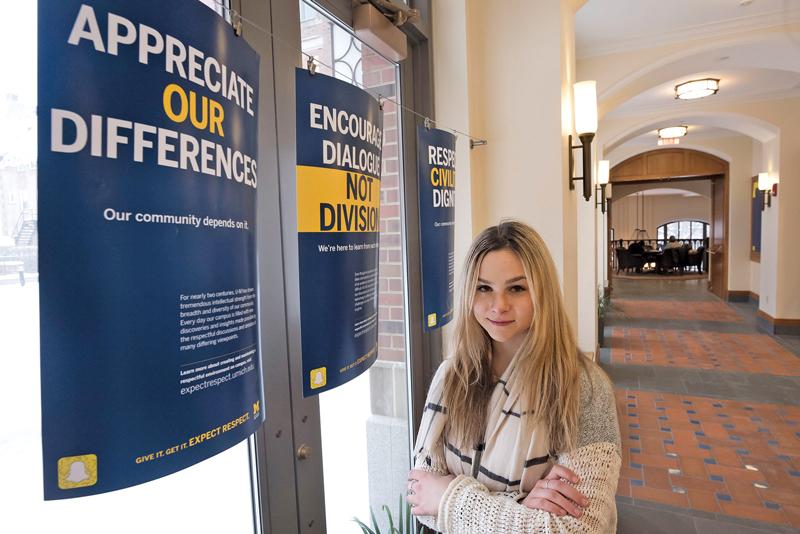A junior in the U-M’s Gerald R. Ford School of Public Policy, Katz obviously knew she’d offend some people by writing about her experiences as an outspoken campus conservative. Still, the extent of the reaction “was more than I expected,” says the Atlanta native, twenty-one. In her November column, she wrote that she’s been called “racist for criticizing some affirmative action programs,” and accused of holding “a baseless hatred of Arabs” for her unabashed defense of Israel. Because of such “pervasive toxic rhetoric,” she wrote, “I now sit quietly and hold my tongue.”
After the article was published, Katz says she received more than fifty personal messages, many praising her for speaking out. Detroit News editorial page editor Nolan Finley interviewed her on his radio show, and a U-M professor messaged her, saying, “You’ll be happy to hear we’ll be discussing your article.”
But there was plenty of pushback. Some students angrily told her the piece was “very offensive.” And the controversy notched higher when a classmate, Allison Brown, responded with her own Daily op-ed. Brown slammed Katz for wearing an expensive Canada Goose coat to class while advocating “ideas that keep millions marginalized, poor and starving.” She added, “I am glad that you do not feel comfortable in class spouting sexism, Islamophobia, bigotry, or fascist opinions.”
Katz, who says the coat was a gift from her grandmother, calls Brown’s piece a “personal attack”–something Brown vehemently denies. The women have never spoken one-on-one; each says it is up to the other to initiate a dialogue.
The tensions aren’t unique to the public policy school or to U-M. Conservative students have long complained of a ruling liberal orthodoxy at elite universities that’s intolerant of dissent. A countervailing view holds that students, especially the poor and minorities, need a safe space free from harmful criticism.
Ford School associate dean for academic affairs Paula Lantz got in touch with Katz after reading the op-ed. “That some students don’t feel they can express their political opinions–of course, that’s alarming to us,” she says. Faculty have been having meetings, she says, to discuss encouraging “political diversity” and recently organized a simulation exercise where students were randomly given political identities as “liberal” or “conservative” and asked to defend those positions in a hypothetical situation.
Lantz says that emotions on campus are running especially high because “we have a new [national] administration who have dramatically shifted policy directions and priorities.” Katz is not a Trump supporter (she says she voted for “Never Trump” Republican Evan McMullin), but she says that the campus became “a lot more closed-minded” after the 2016 election.
She was nervous about publishing the column, she says, as were her parents. She was encouraged by a Daily editor and former sorority sister who, she says, “wanted me to write something, because she says the Daily’s views are very one-sided.”
Katz says she came to Michigan for the “classic college experience,” and that’s what she’s found here (it helps that she loves football). Seeking a career as a Middle East analyst, she puts a positive spin on the condemnation she’s weathered.
“I think I’ll be very prepared when I graduate to deal with the real world.”
—
This article has been edited since it was published in the January 2018 Ann Arbor Observer. The spelling of Allison Brown’s first name has been corrected.
